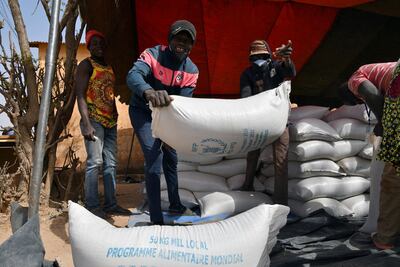The Nobel Peace Prize has been awarded to the World Food Programme (WFP) for fighting global hunger.
The United Nations organisation was lauded "for its contribution to bettering conditions for peace in conflict-affected areas and for acting as a driving force in efforts to prevent the use of hunger as a weapon of war and conflict."
The Nobel Committee said that the coronavirus pandemic has added to the hunger faced by millions of people around the world and called on governments to ensure that WFP and other aid organisations receive the financial support necessary to feed them.
WFP chief David Beasley was overwhelmed: "I think this is the first time in my life I’ve been without words."
Committee Chairwoman Berit Reiss-Andersen said organisers wanted "to turn the eyes of the world to the millions of people who suffer from or face the threat of hunger."
A WFP spokesman said winning the award was a "proud moment" and "nothing short of a feat."
Founded in 1961, the UN organisation helped 97 million people last year, distributing 15 billion rations to people in 88 countries.
The numbers are dizzying but only a fraction of the total number in need.
War can be caused by hunger, but hunger is also a consequence of war, the WFP argues.
Yemen, which is living through what the UN has described as the "largest humanitarian crisis in the world," is a stark example of this.
The conflict has displaced three million people and pushed the country to the verge of famine.
Despite making progress over the past three decades, the UN's goal to eradicate hunger by 2030 appears out of reach if current trends continue, according to experts.
'The sky is falling'
Speaking to The National in June, Mr Beasley stressed the need for more funding as coronavirus ravaged the world.
The WFP chief warned: "Everything is at stake but month by month it’s all hands on deck. It’s not Chicken Licken here saying the sky is falling - it really is falling."
There was no shortage of causes or candidates on this year’s list, with 211 individuals and 107 organisations nominated ahead of the February 1 deadline.
Swedish climate activist Greta Thunberg, Russian dissident Alexei Navalny and the World Health Organisation were tipped as favourites.
Even President Donald Trump seemed to believe he deserved the prize.
There were 318 candidates — 211 individuals and 107 organisations.
The deadline for nominations was February 1 which meant that those on the front lines of fighting Covid-19 - which was only declared a pandemic in March - appeared to be unlikely contenders.
Along with enormous prestige, the prize comes with a 10 million krona (£873,000, $1.1 million) cash award and a gold medal to be handed out at a ceremony in Oslo, Norway, on December 10, the anniversary of prize founder Alfred Nobel’s death.
This year’s ceremony has been scaled down due to the pandemic.
Nelson Mandela, Martin Luther King Jr, Mother Teresa, Mikhail Gorbachev, the Dalai Lama and Anwar Sadat are some of the towering historical figures who have become Nobel Peace Prize laureates.
Last year's winner was Ethiopian prime minister Abiy Ahmed Ali for his work towards ending a 20-year war that ravaged his country.
World Food Programme - fast facts
- Founded in 1962 by former US president Dwight Eisenhower as an experiment
- The organisation became a fully-fledged UN programme in 1965 after successfully responding to an Iran earthquake and a major typhoon in Thailand
- Today it distributes more than 15 billion rations of food every year
- On any given day it has it has 5,600 trucks, 30 ships and nearly 100 planes on the move
- Two thirds of its work takes place in countries experiencing conflict
- It is funded entirely by voluntary donations - most of which comes from governments











